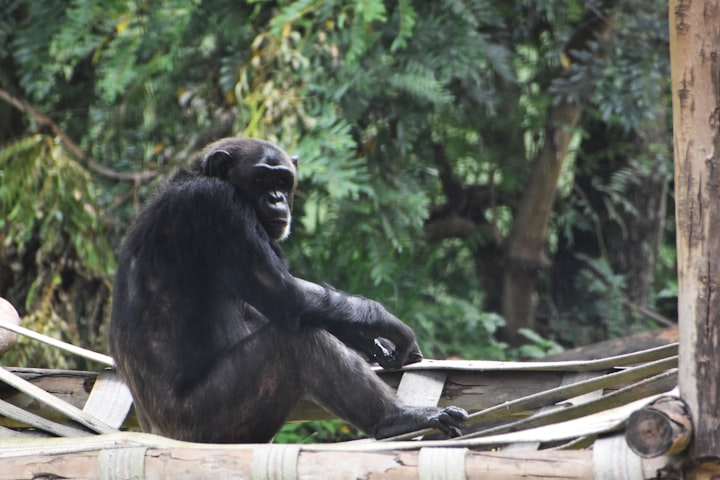Chimpanzees are Using Human-like War Strategy
Stunning New Study Shows that Reconnaissance is an Important Aspect of Chimp Militaristic Operations

A study published in early November 2023 altered the way we perceive the intelligence of chimpanzees. Though it was previously known that the species engaged in some war-like activities between groups, scientists working in Côte d’Ivoire reported behavior much more sophisticated: chimpanzees are engaging in reconnaissance and surveillance.
What Specific Observations Have Been Found About The Chimps?
The study in question that highlights this newly discovered behavior was published by a group of evolutionary anthropologists working with the Taï Chimpanzee Project. Since its publishing date of November 2nd, 2023, it has brought much attention to the most recent study of the world of chimpanzee warfare, which is both shockingly complex and, at times, cinematic.
To determine whether the chimpanzees were employing surveillance tactics, the group gathered three years of behavioral and locational data, focusing on two neighboring groups of chimps who had a slight overlap in their territories in Côte d’Ivoire. Each of the 58 total chimps was meticulously tracked over this period. They recorded the frequency of observation events and then how chimp groups modified their behavior in light of what they observed.
They found that, as the groups of chimpanzees approached each other’s territories, they began to spend more time going to high-elevation areas to observe and then, most notably, would make risk-aversion decisions following these events to avoid each other.
This new information about chimps indicates a wildly more sophisticated way of thinking in chimpanzees than we thought possible. The study says it best, “chimpanzees seek otherwise inaccessible information to adjust their behavior and points to the use of sophisticated cognitive abilities, commensurate with selection for cognition in species where individuals gain benefits from coordinated territorial defense”.
How Do Chimpanzees Engage in Warfare With Each Other?
This recent study elucidates just how truly sophisticated chimpanzees are, but their warfare has been studied for nearly 50 years. Since the great Jane Goodall herself began her meticulous research on the apes, she cited many brutal acts of betrayal, warfare, and violence. “We used to think it was only humans who waged war but we find that chimpanzees, like humans, have this rather unpleasant […] ability to create an in-group and create an out-group. […] The saddest part is that it made them seem even more like us than they had before”. Goodall saw many heart-wrenching acts of violence as she documented the Gombe Chimpanzee War. A single group of chimps, which experienced a split during a transition of power after the passing of an alpha male, engaged in more than just sporadic fights, bites, and chases. The groups began patrolling, posturing, and even making coordinated attacks against each other, killing each other in ways that were less indicative of cold-blooded efficiency and more of rage and brutalism.
When Goodall first reported this, she was highly criticized for “anthropomorphizing” chimp behavior. 1970s scientists were rather skeptical of any animal showcasing cognitive abilities that could rival humans but an overwhelming amount of studies on chimps have since backed up Goodall’s work in Gombe.
How Do We Know that Chimpanzee Surveillance Indicates Sophisticated Intelligence?
Surveillance, followed by a change in behavior points to goal-based thinking and the capacity to seek information to plan ahead. To accomplish such a feat, chimps need both an understanding of space and time, too, along with anticipation and prediction. But, this is only the case if the chimps were indeed actually observing each other and climbing up to taller elevations to do so.
The study accounted for many of the behaviors that could potentially be similar to observation, noting that it seems rather likely that surveillance was part of the purpose of the actions of their study group of chimpanzees but, as is often the case with science, further studies will be needed to confirm this information. I suspect that, as this group continues their study of these individuals, they’ll be able to expand on their methods, shining a wider light on this aspect of chimpanzee behavior. For now, though, the evidence seems rather sound.
What Does This New Study Mean for Chimp Intelligence?
The study indicates that chimps may be more like us than we imagined, and more sophisticated in reasoning than we ever gave them credit for. Like us, they seem to plan for the future and observe their surroundings so that they may make better judgments and avoid unnecessary conflict. Like us, they use the observations of the present to optimize experiences that have yet to come. That points to a thinking, reasoning organism, and not just a machine that directly responds to current stimuli.
Also of note, it seems that the causes for conflict are eerily similar to our own wars — the exchanging of leadership, and competition over limited resources, and territory, among others. At times, observing the behavior of chimpanzees feels like gazing into a mirror. There is so much we have in common with them and so much that studying them can teach us about ourselves.
Though this study only covers one small portion of the chimpanzee psyche, it greatly helps build the case of the primate as a thinking being. When combined with the numerous studies on chimp intelligence that have been published in the last 50 years, it adds to a growing body of research that compellingly states chimpanzees have an intellect worthy of our understanding.
--
The recent revelations expressed by this newly published research have already had quite an impact on our collection of preconceptions about the intelligence of chimps. The information should, too, highlight the incredible similarities between us and them: two creatures both capable of goal-based reasoning, strategic planning, and risk aversion. This study is particularly interesting because of what it points to: more similarity between us and them than we thought possible.
As you infer what these findings could mean, don’t forget to pause to marvel and wonder. The more we uncover about the minds of our primate neighbors, the more we learn about ourselves. Perhaps, in understanding the complexities of chimpanzee intelligence, we may also gain insights into the nature of our own humanity.
--
Cross-Posted from my Medium Blog - Follow For More! :)
About the Creator
Olivia L. Dobbs
Science Enthusiast, Naturalist, Dreamer, Nerd.
I crosspost my Medium articles here :)
You can find my main account on Medium: https://medium.com/@oliviadobbs13
Check out my science! -> bit.ly/DobbsEtAl






Comments (1)
This article is fantastic—I appreciate its well-crafted and informative nature.